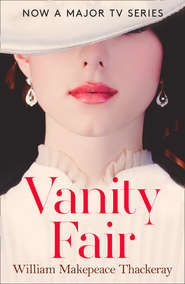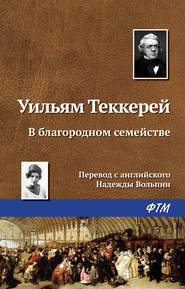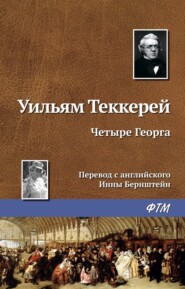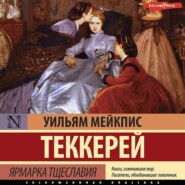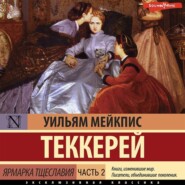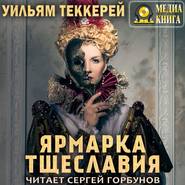По всем вопросам обращайтесь на: info@litportal.ru
(©) 2003-2024.
✖
A History of Pendennis. Volume 1. His fortunes and misfortunes, his friends and his greatest enemy
Настройки чтения
Размер шрифта
Высота строк
Поля
With modest eyes downcast,
She comes – she's here – she's past.
May Heaven go with her!
Kneel undisturb'd, fair saint,
Pour out your praise or plaint
Meekly and duly.
I will not enter there,
To sully your pure prayer
With thoughts unruly.
But suffer me to pace
Round the forbidden place,
Lingering a minute,
Like outcast spirits, who wait
And see through Heaven's gate
Angels within it.
"Have you got any more, young fellow?" asked Warrington. "We must make them give you a couple of guineas a page; and if the verses are liked, why you'll get an entrée into Bacon's magazines, and may turn a decent penny."
Pen examined his portfolio and found another ballad which he thought might figure with advantage in the Spring Annual, and consigning these two precious documents to Warrington, the pair walked from the Temple, to the famous haunt of the Muses and their masters, Paternoster Row. Bacon's shop was an ancient low-browed building, with a few of the books published by the firm displayed in the windows, under a bust of my Lord of Verulam, and the name of Mr. Bacon in brass on the private door. Exactly opposite to Bacon's house was that of Mr. Bungay, which was newly painted and elaborately decorated in the style of the seventeenth century, so that you might have fancied stately Mr. Evelyn passing over the threshold, or curious Mr. Pepys examining the books in the window. Warrington went into the shop of Mr. Bacon, but Pen stayed without. It was agreed that his embassador should act for him entirely; and the young fellow paced up and down the street in a very nervous condition, until he should learn the result of the negotiation. Many a poor devil before him has trodden those flags, with similar cares and anxieties at his heels, his bread and his fame dependent upon the sentence of his magnanimous patrons of the Row. Pen looked at all the wonders of all the shops; and the strange variety of literature which they exhibit. In this were displayed black-letter volumes and books in the clear pale types of Aldus and Elzevir: in the next, you might see the Penny Horrific Register; the Halfpenny Annals of Crime and History of the most celebrated Murderers of all Countries, The Raff's Magazine, The Larky Swell, and other publications of the penny press; while at the next window, portraits of ill-favored individuals, with facsimiles of the venerated signatures of the Reverend Grimes Wapshot, the Reverend Elias Howle, and the works written, and the sermons preached by them, showed the British Dissenter where he could find mental pabulum. Hard by would be a little casement hung with emblems, with medals and rosaries, with little paltry prints of saints, gilt and painted, and books of controversial theology, by which the faithful of the Roman opinion might learn a short way to deal with Protestants, at a penny apiece, or ninepence the dozen for distribution; while in the very next window you might see "Come out of Rome," a sermon preached at the opening of the Shepherd's Bush College, by John Thomas Lord Bishop of Ealing. Scarce an opinion but has its expositor and its place of exhibition in this peaceful old Paternoster Row, under the toll of the bells of Saint Paul.
Pen looked in at all the windows and shops, as a gentleman who is going to have an interview with the dentist, examines the books on the waiting-room table. He remembered them afterward. It seemed to him that Warrington would never come out; and indeed the latter was engaged for some time in pleading his friend's cause.
Pen's natural conceit would have swollen immensely if he could but have heard the report which Warrington gave of him. It happened that Mr. Bacon himself had occasion to descend to Mr. Hack's room while Warrington was talking there, and Warrington knowing Bacon's weaknesses, acted upon them with great adroitness in his friend's behalf. In the first place, he put on his hat to speak to Bacon, and addressed him from the table on which he seated himself. Bacon liked to be treated with rudeness by a gentleman, and used to pass it on to his inferiors, as boys pass the mark. "What! not know Mr. Pendennis, Mr. Bacon?" Warrington said. "You can't live much in the world, or you would know him. A man of property in the West, of one of the most ancient families in England, related to half the nobility in the empire – he's cousin to Lord Pontypool – he was one of the most distinguished men at Oxbridge; he dines at Gaunt House every week."
"Law bless me, you don't say so, sir. Well – really – Law bless me now," said Mr. Bacon.
"I have just been showing Mr. Hack some of his verses, which he sat up last night, at my request, to write; and Hack talks about giving him a copy of the book – the what-d'-you-call-'em."
"Law bless me now, does he? The what-d'-you-call-'em. Indeed!"
"'The Spring Annual' is its name – as payment for these verses. You don't suppose that such a man as Mr. Arthur Pendennis gives up a dinner at Gaunt House for nothing? You know, as well as any body, that the men of fashion want to be paid."
"That they do, Mr. Warrington, sir," said the publisher.
"I tell you he's a star; he'll make a name, sir. He's a new man, sir."
"They've said that of so many of those young swells, Mr. Warrington," the publisher interposed, with a sigh. "There was Lord Viscount Dodo, now; I gave his lordship a good bit of money for his poems, and only sold eighty copies. Mr. Popjoy's Hadgincourt, sir, fell dead."
"Well, then, I'll take my man over to Bungay," Warrington said, and rose from the table. This threat was too much for Mr. Bacon, who was instantly ready to accede to any reasonable proposal of Mr. Warrington's, and finally asked his manager what those proposals were. When he heard that the negotiation only related as yet to a couple of ballads, which Mr. Warrington offered for the Spring Annual, Mr. Bacon said, "Law bless you, give him a check directly;" and with this paper Warrington went out to his friend, and placed it, grinning, in Pen's hands. Pen was as elated as if somebody had left him a fortune. He offered Warrington a dinner at Richmond instantly. "What should he go and buy for Laura and his mother? He must buy something for them."
"They'll like the book better than any thing else," said Warrington, "with the young one's name to the verses, printed among the swells."
"Thank God! thank God!" cried Arthur, "I needn't be a charge upon the old mother. I can pay off Laura now. I can get my own living. I can make my own way."
"I can marry the grand vizier's daughter; I can purchase a house in Belgrave Square; I can build a fine castle in the air!" said Warrington, pleased with the other's exultation. "Well, you may get bread and cheese, Pen: and I own it tastes well, the bread which you earn yourself."
They had a magnum of claret at dinner at the club that day, at Pen's charges. It was long since he had indulged in such a luxury, but Warrington would not balk him; and they drank together to the health of the Spring Annual.
It never rains but it pours, according to the proverb; so very speedily another chance occurred, by which Mr. Pen was to be helped in his scheme of making a livelihood. Warrington one day threw him a letter across the table, which was brought by a printer's boy, "from Captain Shandon, sir" – the little emissary said: and then went and fell asleep on his accustomed bench in the passage. He paid many a subsequent visit there, and brought many a message to Pen.
"F. P. Tuesday Morning.
"My Dear Sir,
"Bungay will be here to-day about the 'Pall-Mall Gazette.' You would be the very man to help us with a genuine West-end article– you understand – dashing, trenchant, and d – aristocratic. Lady Hipshaw will write; but she's not much, you know; and we've two lords, but the less they do the better. We must have you. We'll give you your own terms, and we'll make a hit with the 'Gazette.'
"Shall B. come and see you, or can you look in upon me here?
"Ever yours,
"C. S."
"Some more opposition," Warrington said, when Pen had read the note. "Bungay and Bacon are at daggers-drawn; each married the sister of the other, and they were for some time the closest friends and partners. Hack says it was Mrs. Bungay who caused all the mischief between the two; whereas Shandon, who reads for Bungay a good deal, says Mrs. Bacon did the business; but I don't know which is right, Peachum or Lockit. But since they have separated, it is a furious war between the two publishers; and no sooner does one bring out a book of travels, or poems, a magazine or periodical, quarterly, or monthly, or weekly, or annual, but the rival is in the field with something similar. I have heard poor Shandon tell with great glee how he made Bungay give a grand dinner at Blackwall to all his writers, by saying that Bacon had invited his corps to an entertainment at Greenwich. When Bungay engaged your celebrated friend Mr. Wagg to edit the 'Londoner,' Bacon straightway rushed off and secured Mr. Grindle to give his name to the 'Westminster Magazine.' When Bacon brought out his comic Irish novel of 'Barney Brallaghan,' off went Bungay to Dublin, and produced his rollicking Hibernian story of 'Looney MacTwolter.' When Doctor Hicks brought out his 'Wanderings in Mesopotamia,' under Bacon's auspices, Bungay produced Professor Sandiman's 'Researches in Zahara;' and Bungay is publishing his 'Pall-Mall Gazette' as a counterpoise to Bacon's 'Whitehall Review.' Let us go and hear about the 'Gazette.' There may be a place for you in it, Pen, my boy. We will go and see Shandon. We are sure to find him at home."
"Where does he live?" asked Pen.
"In the Fleet Prison," Warrington said. "And very much at home he is there, too. He is the king of the place."
Pen had never seen this scene of London life, and walked with no small interest in at the grim gate of that dismal edifice. They went through the ante-room, where the officers and janitors of the place were seated, and passing in at the wicket, entered the prison. The noise and the crowd, the life and the shouting, the shabby bustle of the place, struck and excited Pen. People moved about ceaselessly and restless, like caged animals in a menagerie. Men were playing at fives. Others pacing and tramping: this one in colloquy with his lawyer in dingy black – that one walking sadly, with his wife by his side, and a child on his arm. Some were arrayed in tattered dressing-gowns, and had a look of rakish fashion. Every body seemed to be busy, humming, and on the move. Pen felt as if he choked in the place, and as if the door being locked upon him they never would let him out.
They went through a court up a stone staircase, and through passages full of people, and noise, and cross lights, and black doors clapping and banging; Pen feeling as one does in a feverish morning-dream. At last the same little runner who had brought Shandon's note, and had followed them down Fleet-street munching apples, and who showed the way to the two gentlemen through the prison, said, "This is the captain's door," and Mr. Shandon's voice from within bade them enter.
The room, though bare, was not uncheerful. The sun was shining in at the window – near which sate a lady at work, who had been gay and beautiful once, but in whose faded face kindness and tenderness still beamed. Through all his errors and reckless mishaps and misfortunes, this faithful creature adored her husband, and thought him the best and cleverest, as indeed he was one of the kindest of men. Nothing ever seemed to disturb the sweetness of his temper; not debts: not duns: not misery: not the bottle: not his wife's unhappy position, or his children's ruined chances. He was perfectly fond of wife and children, after his fashion: he always had the kindest words and smiles for them, and ruined them with the utmost sweetness of temper. He never could refuse himself or any man any enjoyment which his money could purchase; he would share his last guinea with Jack and Tom, and we may be sure he had a score of such retainers. He would sign his name at the back of any man's bill, and never pay any debt of his own. He would write on any side, and attack himself or another man with equal indifference. He was one of the wittiest, the most amiable, and the most incorrigible of Irishmen. Nobody could help liking Charley Shandon who saw him once, and those whom he ruined could scarcely be angry with him.
When Pen and Warrington arrived, the captain (he had been in an Irish militia regiment once, and the title remained with him) was sitting on his bed in a torn dressing-gown, with a desk on his knees, at which he was scribbling as fast as his rapid pen could write. Slip after slip of paper fell off the desk wet on to the ground. A picture of his children was hung up over his bed, and the youngest of them was pattering about the room.
Opposite the captain sate Mr. Bungay, a portly man of stolid countenance, with whom the little child had been trying a conversation.
"Papa's a very clever man," said she; "mamma says so."
"Oh, very," said Mr. Bungay.
"And you're a very rich man, Mr. Bundy," cried the child, who could hardly speak plain.
"Mary!" said mamma, from her work.
"Oh, never mind," Bungay roared out with a great laugh; "no harm in saying I'm rich – he, he – I am pretty well off, my little dear."
"If you're rich, why don't you take papa out of piz'n?" asked the child.
Mamma at this began to wipe her eyes with the work on which she was employed. (The poor lady had hung curtains up in the room, had brought the children's picture and placed it there, and had made one or two attempts to ornament it.) Mamma began to cry; Mr. Bungay turned red, and looked fiercely out of his blood-shot little eyes; Shandon's pen went on, and Pen and Warrington arrived with their knock.
Captain Shandon looked up from his work. "How do you do, Mr. Warrington," he said. "I'll speak to you in a minute. Please sit down, gentlemen, if you can find places," and away went the pen again.
Warrington pulled forward an old portmanteau – the only available seat – and sate down on it with a bow to Mrs. Shandon, and a nod to Bungay: the child came and looked at Pen solemnly: and in a couple of minutes the swift scribbling ceased; and Shandon, turning the desk over on the bed, stooped and picked up the papers.
"I think this will do," said he. "It's the prospectus for the 'Pall-Mall Gazette.'"
"And here's the money for it," Mr. Bungay said, laying down a five-pound note. "I'm as good as my word, I am. When I say I'll pay, I pay."
She comes – she's here – she's past.
May Heaven go with her!
Kneel undisturb'd, fair saint,
Pour out your praise or plaint
Meekly and duly.
I will not enter there,
To sully your pure prayer
With thoughts unruly.
But suffer me to pace
Round the forbidden place,
Lingering a minute,
Like outcast spirits, who wait
And see through Heaven's gate
Angels within it.
"Have you got any more, young fellow?" asked Warrington. "We must make them give you a couple of guineas a page; and if the verses are liked, why you'll get an entrée into Bacon's magazines, and may turn a decent penny."
Pen examined his portfolio and found another ballad which he thought might figure with advantage in the Spring Annual, and consigning these two precious documents to Warrington, the pair walked from the Temple, to the famous haunt of the Muses and their masters, Paternoster Row. Bacon's shop was an ancient low-browed building, with a few of the books published by the firm displayed in the windows, under a bust of my Lord of Verulam, and the name of Mr. Bacon in brass on the private door. Exactly opposite to Bacon's house was that of Mr. Bungay, which was newly painted and elaborately decorated in the style of the seventeenth century, so that you might have fancied stately Mr. Evelyn passing over the threshold, or curious Mr. Pepys examining the books in the window. Warrington went into the shop of Mr. Bacon, but Pen stayed without. It was agreed that his embassador should act for him entirely; and the young fellow paced up and down the street in a very nervous condition, until he should learn the result of the negotiation. Many a poor devil before him has trodden those flags, with similar cares and anxieties at his heels, his bread and his fame dependent upon the sentence of his magnanimous patrons of the Row. Pen looked at all the wonders of all the shops; and the strange variety of literature which they exhibit. In this were displayed black-letter volumes and books in the clear pale types of Aldus and Elzevir: in the next, you might see the Penny Horrific Register; the Halfpenny Annals of Crime and History of the most celebrated Murderers of all Countries, The Raff's Magazine, The Larky Swell, and other publications of the penny press; while at the next window, portraits of ill-favored individuals, with facsimiles of the venerated signatures of the Reverend Grimes Wapshot, the Reverend Elias Howle, and the works written, and the sermons preached by them, showed the British Dissenter where he could find mental pabulum. Hard by would be a little casement hung with emblems, with medals and rosaries, with little paltry prints of saints, gilt and painted, and books of controversial theology, by which the faithful of the Roman opinion might learn a short way to deal with Protestants, at a penny apiece, or ninepence the dozen for distribution; while in the very next window you might see "Come out of Rome," a sermon preached at the opening of the Shepherd's Bush College, by John Thomas Lord Bishop of Ealing. Scarce an opinion but has its expositor and its place of exhibition in this peaceful old Paternoster Row, under the toll of the bells of Saint Paul.
Pen looked in at all the windows and shops, as a gentleman who is going to have an interview with the dentist, examines the books on the waiting-room table. He remembered them afterward. It seemed to him that Warrington would never come out; and indeed the latter was engaged for some time in pleading his friend's cause.
Pen's natural conceit would have swollen immensely if he could but have heard the report which Warrington gave of him. It happened that Mr. Bacon himself had occasion to descend to Mr. Hack's room while Warrington was talking there, and Warrington knowing Bacon's weaknesses, acted upon them with great adroitness in his friend's behalf. In the first place, he put on his hat to speak to Bacon, and addressed him from the table on which he seated himself. Bacon liked to be treated with rudeness by a gentleman, and used to pass it on to his inferiors, as boys pass the mark. "What! not know Mr. Pendennis, Mr. Bacon?" Warrington said. "You can't live much in the world, or you would know him. A man of property in the West, of one of the most ancient families in England, related to half the nobility in the empire – he's cousin to Lord Pontypool – he was one of the most distinguished men at Oxbridge; he dines at Gaunt House every week."
"Law bless me, you don't say so, sir. Well – really – Law bless me now," said Mr. Bacon.
"I have just been showing Mr. Hack some of his verses, which he sat up last night, at my request, to write; and Hack talks about giving him a copy of the book – the what-d'-you-call-'em."
"Law bless me now, does he? The what-d'-you-call-'em. Indeed!"
"'The Spring Annual' is its name – as payment for these verses. You don't suppose that such a man as Mr. Arthur Pendennis gives up a dinner at Gaunt House for nothing? You know, as well as any body, that the men of fashion want to be paid."
"That they do, Mr. Warrington, sir," said the publisher.
"I tell you he's a star; he'll make a name, sir. He's a new man, sir."
"They've said that of so many of those young swells, Mr. Warrington," the publisher interposed, with a sigh. "There was Lord Viscount Dodo, now; I gave his lordship a good bit of money for his poems, and only sold eighty copies. Mr. Popjoy's Hadgincourt, sir, fell dead."
"Well, then, I'll take my man over to Bungay," Warrington said, and rose from the table. This threat was too much for Mr. Bacon, who was instantly ready to accede to any reasonable proposal of Mr. Warrington's, and finally asked his manager what those proposals were. When he heard that the negotiation only related as yet to a couple of ballads, which Mr. Warrington offered for the Spring Annual, Mr. Bacon said, "Law bless you, give him a check directly;" and with this paper Warrington went out to his friend, and placed it, grinning, in Pen's hands. Pen was as elated as if somebody had left him a fortune. He offered Warrington a dinner at Richmond instantly. "What should he go and buy for Laura and his mother? He must buy something for them."
"They'll like the book better than any thing else," said Warrington, "with the young one's name to the verses, printed among the swells."
"Thank God! thank God!" cried Arthur, "I needn't be a charge upon the old mother. I can pay off Laura now. I can get my own living. I can make my own way."
"I can marry the grand vizier's daughter; I can purchase a house in Belgrave Square; I can build a fine castle in the air!" said Warrington, pleased with the other's exultation. "Well, you may get bread and cheese, Pen: and I own it tastes well, the bread which you earn yourself."
They had a magnum of claret at dinner at the club that day, at Pen's charges. It was long since he had indulged in such a luxury, but Warrington would not balk him; and they drank together to the health of the Spring Annual.
It never rains but it pours, according to the proverb; so very speedily another chance occurred, by which Mr. Pen was to be helped in his scheme of making a livelihood. Warrington one day threw him a letter across the table, which was brought by a printer's boy, "from Captain Shandon, sir" – the little emissary said: and then went and fell asleep on his accustomed bench in the passage. He paid many a subsequent visit there, and brought many a message to Pen.
"F. P. Tuesday Morning.
"My Dear Sir,
"Bungay will be here to-day about the 'Pall-Mall Gazette.' You would be the very man to help us with a genuine West-end article– you understand – dashing, trenchant, and d – aristocratic. Lady Hipshaw will write; but she's not much, you know; and we've two lords, but the less they do the better. We must have you. We'll give you your own terms, and we'll make a hit with the 'Gazette.'
"Shall B. come and see you, or can you look in upon me here?
"Ever yours,
"C. S."
"Some more opposition," Warrington said, when Pen had read the note. "Bungay and Bacon are at daggers-drawn; each married the sister of the other, and they were for some time the closest friends and partners. Hack says it was Mrs. Bungay who caused all the mischief between the two; whereas Shandon, who reads for Bungay a good deal, says Mrs. Bacon did the business; but I don't know which is right, Peachum or Lockit. But since they have separated, it is a furious war between the two publishers; and no sooner does one bring out a book of travels, or poems, a magazine or periodical, quarterly, or monthly, or weekly, or annual, but the rival is in the field with something similar. I have heard poor Shandon tell with great glee how he made Bungay give a grand dinner at Blackwall to all his writers, by saying that Bacon had invited his corps to an entertainment at Greenwich. When Bungay engaged your celebrated friend Mr. Wagg to edit the 'Londoner,' Bacon straightway rushed off and secured Mr. Grindle to give his name to the 'Westminster Magazine.' When Bacon brought out his comic Irish novel of 'Barney Brallaghan,' off went Bungay to Dublin, and produced his rollicking Hibernian story of 'Looney MacTwolter.' When Doctor Hicks brought out his 'Wanderings in Mesopotamia,' under Bacon's auspices, Bungay produced Professor Sandiman's 'Researches in Zahara;' and Bungay is publishing his 'Pall-Mall Gazette' as a counterpoise to Bacon's 'Whitehall Review.' Let us go and hear about the 'Gazette.' There may be a place for you in it, Pen, my boy. We will go and see Shandon. We are sure to find him at home."
"Where does he live?" asked Pen.
"In the Fleet Prison," Warrington said. "And very much at home he is there, too. He is the king of the place."
Pen had never seen this scene of London life, and walked with no small interest in at the grim gate of that dismal edifice. They went through the ante-room, where the officers and janitors of the place were seated, and passing in at the wicket, entered the prison. The noise and the crowd, the life and the shouting, the shabby bustle of the place, struck and excited Pen. People moved about ceaselessly and restless, like caged animals in a menagerie. Men were playing at fives. Others pacing and tramping: this one in colloquy with his lawyer in dingy black – that one walking sadly, with his wife by his side, and a child on his arm. Some were arrayed in tattered dressing-gowns, and had a look of rakish fashion. Every body seemed to be busy, humming, and on the move. Pen felt as if he choked in the place, and as if the door being locked upon him they never would let him out.
They went through a court up a stone staircase, and through passages full of people, and noise, and cross lights, and black doors clapping and banging; Pen feeling as one does in a feverish morning-dream. At last the same little runner who had brought Shandon's note, and had followed them down Fleet-street munching apples, and who showed the way to the two gentlemen through the prison, said, "This is the captain's door," and Mr. Shandon's voice from within bade them enter.
The room, though bare, was not uncheerful. The sun was shining in at the window – near which sate a lady at work, who had been gay and beautiful once, but in whose faded face kindness and tenderness still beamed. Through all his errors and reckless mishaps and misfortunes, this faithful creature adored her husband, and thought him the best and cleverest, as indeed he was one of the kindest of men. Nothing ever seemed to disturb the sweetness of his temper; not debts: not duns: not misery: not the bottle: not his wife's unhappy position, or his children's ruined chances. He was perfectly fond of wife and children, after his fashion: he always had the kindest words and smiles for them, and ruined them with the utmost sweetness of temper. He never could refuse himself or any man any enjoyment which his money could purchase; he would share his last guinea with Jack and Tom, and we may be sure he had a score of such retainers. He would sign his name at the back of any man's bill, and never pay any debt of his own. He would write on any side, and attack himself or another man with equal indifference. He was one of the wittiest, the most amiable, and the most incorrigible of Irishmen. Nobody could help liking Charley Shandon who saw him once, and those whom he ruined could scarcely be angry with him.
When Pen and Warrington arrived, the captain (he had been in an Irish militia regiment once, and the title remained with him) was sitting on his bed in a torn dressing-gown, with a desk on his knees, at which he was scribbling as fast as his rapid pen could write. Slip after slip of paper fell off the desk wet on to the ground. A picture of his children was hung up over his bed, and the youngest of them was pattering about the room.
Opposite the captain sate Mr. Bungay, a portly man of stolid countenance, with whom the little child had been trying a conversation.
"Papa's a very clever man," said she; "mamma says so."
"Oh, very," said Mr. Bungay.
"And you're a very rich man, Mr. Bundy," cried the child, who could hardly speak plain.
"Mary!" said mamma, from her work.
"Oh, never mind," Bungay roared out with a great laugh; "no harm in saying I'm rich – he, he – I am pretty well off, my little dear."
"If you're rich, why don't you take papa out of piz'n?" asked the child.
Mamma at this began to wipe her eyes with the work on which she was employed. (The poor lady had hung curtains up in the room, had brought the children's picture and placed it there, and had made one or two attempts to ornament it.) Mamma began to cry; Mr. Bungay turned red, and looked fiercely out of his blood-shot little eyes; Shandon's pen went on, and Pen and Warrington arrived with their knock.
Captain Shandon looked up from his work. "How do you do, Mr. Warrington," he said. "I'll speak to you in a minute. Please sit down, gentlemen, if you can find places," and away went the pen again.
Warrington pulled forward an old portmanteau – the only available seat – and sate down on it with a bow to Mrs. Shandon, and a nod to Bungay: the child came and looked at Pen solemnly: and in a couple of minutes the swift scribbling ceased; and Shandon, turning the desk over on the bed, stooped and picked up the papers.
"I think this will do," said he. "It's the prospectus for the 'Pall-Mall Gazette.'"
"And here's the money for it," Mr. Bungay said, laying down a five-pound note. "I'm as good as my word, I am. When I say I'll pay, I pay."






